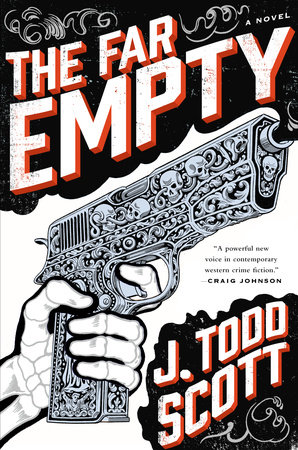The Far Empty by J. Todd Scott
 By Matt Ferraz
By Matt Ferraz
Having traveled around the word for twenty years as a DEA special agent, J. Todd Scott knows the drill when it comes to law enforcement procedures. With his upcoming debut novel THE FAR EMPTY, Scott creates a modern western environment, set in the small town of Murfee, in the Big Bend area of Texas. There, two men join forces to take down an untouchable figure that commands the town. Chris Cherry is a once promising high school football hero who has to come back to Murfee and become a deputy under the orders of Sheriff Standford “Judge” Ross. Caleb Ross, on the other hand, is Judge Ross’ son, and believes his father might be responsible for the death of his mother. Together, Chris and Caleb form an unlikely partnership to defy the sheriff, and find many skeletons in the town’s closets.
Scott already had the book’s opening line (My father has killed three men…) written down for quite some time, but only managed to carry on after deciding to set the story in the Big Bend. Instead of creating a straightforward period piece western, Scott decided to set THE FAR EMPTY in modern days, in order to tackle many of the issues he got to know during his years as a law enforcement agent, such as drug and alien smuggling and corruption. That meant a lot of research on the region, which also served the book’s two upcoming sequels, one of which is already finished.
Westerns being a cinematic genre by definition, Scott draws lots of influence from classic and spaghetti western, and also later movies like Unforgiven, The Assassination of Jesse James by the Coward Robert Ford and Appaloosa, as well as the True Grit and 3:10 to Yuma remakes. William Fridekin’s To Live and Die in L.A., adapted from a book by former U.S. Secret Service Agent Gerald Petievich was also an inspiration. The author wanted to do for the Big Bend what that movie did for Los Angeles.
But can all this roughness and grit affect the literary quality of a novel? “Ultimately, I want the places in my books to feel real, to seem truly three-dimensional, even if the characters that inhabit these places make dramatic and often unwise decisions,” the author explains. “I also try to capture some lyricism in language, even when I’m writing about darkness and violence. The descent of Duane Dupree in the course of the narrative as he succumbs to meth addiction is a prime example. In order to really show his mind’s inexorable disintegration, I put him through several vivid, dramatic hallucinations. It’s tough at times for Duane to know what’s real, and I imagine that’s true for the reader as well.”
Asked about the first thriller he ever read, and what made it memorable, Scott mentions many of Robert Ludlum’s books, such as The Bourne Identity, Michael Crichton’s Congo, David Morrel’s First Blood and Peter Benchley’s Jaws. “My parents were voracious readers and their books were always around the house, so I was exposed to all of these in the early eighties, just as I was entering high school,” he states. “Although as a writer I never felt I could plot on the scale of Ludlum with his broad, world-class spy thrillers, or master the amazing science in Crichton’s works, I appreciated their ability to get the reader in me to turn the page.”
Scott borrowed grit and realism from his background in law enforcement for THE FAR EMPTY, which might not have happened had the author followed his early plan of taking an MFA in Writing at the college. “Ultimately I did what I thought I was most practical: I got married and went to law school,” he says. “And although writing was my first love, I’d always had a keen interest in federal law enforcement too, so when I had the opportunity to join the DEA as a Special Agent I jumped at it. For the next twenty years, I traveled all around the world chasing bad guys. Not a bad way to make a living at all.” It’s not a choice he regrets, looking back, as a novel like THE FAR EMPTY wouldn’t be likely to survive the hothouse of an MFA program. “I think writing itself is the key, whether you do it at your kitchen table or in a classroom. Just get the work done, one word after another.”
*****
 J. Todd Scott has been a federal agent with the DEA for more than twenty years, working cases investigating international maritime smuggling, domestic meth labs, and Mexican cartels. He has a law degree from George Mason University and is a father of three. A Kentucky native, he now resides in the Southwest, which provided the backdrop for THE FAR EMPTY, his first novel.
J. Todd Scott has been a federal agent with the DEA for more than twenty years, working cases investigating international maritime smuggling, domestic meth labs, and Mexican cartels. He has a law degree from George Mason University and is a father of three. A Kentucky native, he now resides in the Southwest, which provided the backdrop for THE FAR EMPTY, his first novel.
To learn more about J. Todd Scott, please visit his website.
- The Vanishing Year by Kate Moretti - September 30, 2016
- Triple Shot by Ross Klavan, Tim O’Mara and Charles Salzberg - August 31, 2016
- Tag, You’re Dead by J. C. Lane - June 30, 2016
